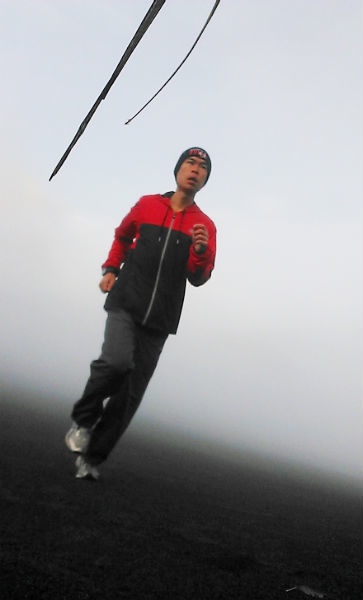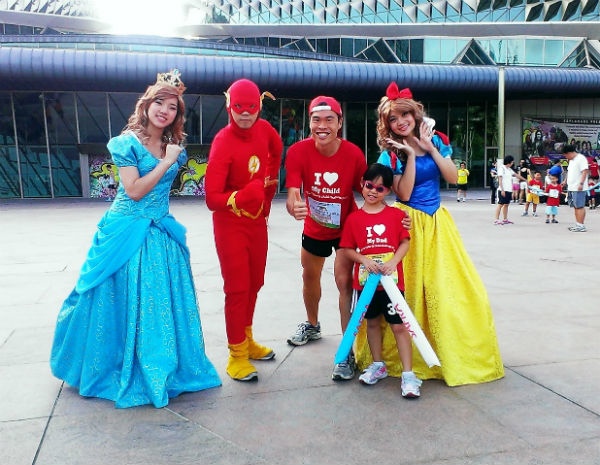He is an avid runner and conquered the challenging 100km Sundown Ultra Marathon last year – in a stunning time of 9 hours 5 minutes and 34 seconds.
I caught up with 33-year-old Wong Hoong Wei and got some tips from the Education Officer on running a night marathon.
Here is what Hoong Wei said, in an interview that I had with him.
Hoong Wei, what are your comments on night running?
Most of my training is done in the morning, so my body feels more ready to go at that time of the day. Catching the sunrise also seems to rejuvenate me if it occurs midway through a run. I usually sleep early, so I find running a race at night requires a little more effort and preparation.
What are the biggest challenges of running a night marathon race, such as the Sundown Marathon? How do you overcome these?
When I run a morning race, I feel fresh from a good night’s sleep. From the moment I wake, I am focused on the flag-off timing and am able to prepare myself a little better. I don’t have too much in my stomach except for breakfast, which I watch carefully so there is less risk of digestive issues during the run. I find it more difficult to race at night as the day’s events at work and home contribute to stress that takes my focus off the race. If the day was tiring or involved moving around a lot, I’d be somewhat sleepy by the time flag-off comes. In addition, I would have had a few good meals before flag-off, and depending on how well I managed those, I might feel bloated.
To overcome some of these challenges, plan an easy day if you can, to avoid unnecessary physical and mental stress. Eat foods that digest easily, and have an early dinner at least a few hours before the race. This meal should not be too heavy, and you should avoid foods that your stomach is sensitive to. This comes with experience, but my personal list of foods to avoid, include dairy and raw vegetables. If the race is long, such as a marathon, a short afternoon nap usually helps me rest the legs and reset my mind. However, a working day usually does not allow such a luxury, though.
How can runners beat the sleep bug during a night marathon?
I find that if I had a good night’s sleep for the days leading up to a race, the adrenaline during the race is sufficient to keep me focused on running instead of sleeping. I will advise runners not to worry too much about keeping awake if they had quality sleep the night before. On the other hand, it doesn’t hurt to have a short afternoon nap if you can afford it.
How should a runner train for a night race?
Training at night will be a good thing, and I feel the benefits are more psychological than physical. Doing some night training will boost my confidence and affirm myself that I can handle running in the dark after a long day at work.
How would you advise runners on their pre-race diet?
Diet is very personal, and it is important for athletes to find something that works for them and practise it throughout the training cycle – not just before the race. If you abide by nutrition principles that provide you with a sufficient energy intake during training and allows you to recover from the sessions, there isn’t a need to change anything leading up to the race.
What is a good recovery drink after a marathon?
After a marathon, I usually drink water. This is because I would have consumed so much refined sugar during the race in the form of sports drinks and gels that plain water is all I crave. Of course, I would complement it with a good meal to ensure I get the nutrients I need to recover well.
What are your comments on compression tights and elastic therapeutic tapes, such as Acti Tapes?
I don’t have any experience with them so it will be unfair for me to comment. On the other hand, doing without them has worked for me so far, so there’s no need to change anything yet.
However, my legs do swell occasionally after long runs, and one day I will try compression gear to see if it aids my recovery. I haven’t the opportunity yet as I am too lazy to go out and buy some.
Any tips for runners on how to stay injury free?
I am absolutely unqualified to give any advice after some injuries sidelined me recently. These injuries were related to over-training and over-use, so I guess the best advice I can give is for runners to avoid thinking that more training equals more progress. Adopting a long-term perspective reminds me that progress is a long-term result of consistent effort, not short bouts of intense training.
What tips can you give to someone who is taking on the Full Marathon at Sundown Marathon for the first time this year?
Aside from the pointers of preparing for a night race touched on earlier, someone who is taking on their first full marathon should focus on enjoying the preparation and the race experience! As you run more marathons, you’ll naturally aspire to push yourself further and faster, but there’ll be plenty of time for that later. For now, try to enjoy your first marathon, and you’ll be back for more!
Get Tips From Other Top Runners!
Click here for tips from Sundown Marathon 42km conqueror in 2012, Alex Ong
Click here for tips from 5km and 10km specialist and 2009 Sundown Marathon 10km champion, Marcus Ong
Click here for tips from Mok Ying Ren’s running buddy and regular podium finisher, Ivan Low




Leave a Comment